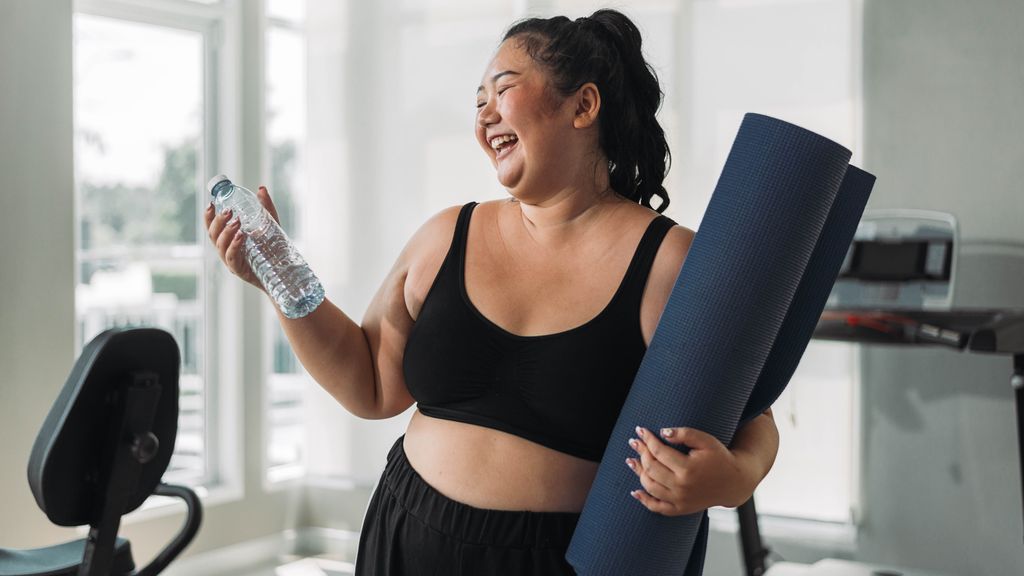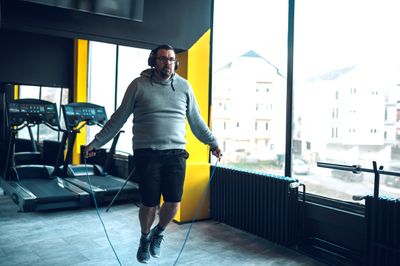
Did you make a New Year's fitness resolution last year? Did you keep it?
If you're like most people I've coached, the answer is–probably not. In fact, 91% of New Year’s resolutions are fitness related, and nearly 80% of people give up on them by January 19.
The truth is that most people never reach their goals. Instead, they remain forever on the proverbial hamster wheel–doing the same workouts and living the same lifestyle–unhappy with their results.
Does that mean fitness resolutions don't work? Or are we simply setting the wrong goals?
In this article, I share the most important questions you must ask yourself when setting fitness goals, explain the science of behavior change, and share my expert tips from my ten years as a personal trainer for building fitness for life.
I'll also share wisdom from three other certified personal trainers with decades of experience who've perfected the art of helping clients set their New Year's resolutions and succeed all year.
Get our fitness newsletter
Stay on track with your fitness goals and get inspired! Sign up for the GymBird newsletter for twice-monthly expert fitness and nutrition tips.
Charting a Clear Path Forward in 2024: Making Fitness Resolutions that Stick
Fitness resolutions–and any long-term behavioral changes– rely on habit formation. A habit is reflexive. It's our baseline, the action we take without putting in the effort of thinking first.
Shaping our habits can be a powerful tool to boost healthy behaviors and minimize harmful ones. But changing our habits for the long term is easier said than done.
Most of us know that certain daily habits, such as walking 10,000 steps, eating 5 to 7 fruits and veggies, and abstaining from smoking, will increase our health and longevity and prevent disease.
Yet, so many of us struggle to stick with these simple daily habits. We want to change and know we should, but it can be challenging to make these changes permanent. So what gives?
The Science of Behavior Change
Tell me if this situation sounds familiar.
You read a blog or watched a documentary and are inspired to change some aspect of your health.
Maybe you'll eat more vegetables, lose that last 10 pounds, or train for the half marathon you've always dreamed of.
You've tried to achieve this goal before, but you'll surely succeed this time! How can you not? With the New Year right around the corner and this burning, insatiable desire you feel, you're sure to win next year.
Fast forward three to six months: your running shoes sit untouched, and that kale you keep buying has rotted for the sixth week in a row.
Are you a failure who's incapable of change? Do you need more willpower?
If this sounds familiar, you're not alone. So how can some people stick to their fitness goals while many of us can't?
How we approach our health goals plays a much bigger role in our success than any other factor.
So no, you aren't weak, undisciplined, or lacking willpower. You just need support setting goals, and we're here to help.
Emotional Regulation First
When trying to make a change, it's common to focus on increasing your knowledge. In my years of coaching, I have seen countless clients endlessly chase more and more data in an effort to become healthier.
Subconsciously, you believe that consuming another book, podcast, or video will provide you with the secret knowledge you need to achieve your goals.
Here's the thing: geeking out on health and fitness information isn't bad, but a lack of knowledge is not the main obstacle standing between you and your goal.
While we may forget it at times, humans are animals. And while we're capable of higher-level thinking and tremendous feats of creation and ingenuity, our behaviors are primarily dictated by our habits and environment–not our knowledge or desire–just like any other animal.
Our ability to build new habits hugely depends on having the mental resources to create new neural pathways that allow behaviors to become ingrained habits. When we don't have extra mental resources–when we're flying around in a state of elevated stress and dysregulation, for example–we fall back to our default programming.
If we're going to create lasting behavioral change, we need to slow down enough to experience our environment and our physical sensations. By cultivating mindfulness, we feel more calm and energized and stand a much better chance at change.
We are what we repeatedly do. And evolutionarily, that makes sense.
Change Is Expensive, Biologically Speaking
Your body is incredibly clever, and its primary objective is to keep you alive. It does this in countless ways and through varying mechanisms, all working together to return you to a state of normalcy called homeostasis.
Maintaining the status quo is the goal; whenever we try to substantially deviate from it, there is an energetic cost. So your brain isn't incentivized for change. It likes to stay cozy in the comfort zone with your established habits.
When we set out to create a new habit, it requires brain energy. For a few months, we must actively think about the habit and the steps needed to execute it. This uses up precious glucose as an energy source that our body would rather save for an emergency.
In our non-stop busy culture, where most of us have brimming schedules and endless responsibilities, extra energy is often in short supply.
Erin Altemus is a Functional Nutritional Therapy Practitioner and certified personal trainer with 20 years of experience in healthcare and fitness. Altemus teaches her clients the science of behavior change throughout their goal-setting process.
"The most important concept I want people to understand is the window of tolerance,” Altemus said. “Our brain is only comfortable with the limited behaviors we are used to. If we try to change too much too fast, we become dysregulated and overwhelmed."
When we get emotionally overwhelmed, following through on the new habits we're trying to build is much harder. To successfully set new fitness goals and create new habits, we must first feel safe psychologically, and our stress must be managed.
Tips for Holiday Goal Setting from Experienced Personal Trainers
New Year's resolutions are the perfect opportunity to practice healthy goal-setting and build new habits. But because they're unsuccessful for most people, they sometimes get a bad rap in the fitness industry, and I understand why.
Diet culture sets us up to have ridiculous expectations for the way our bodies 'should' look or perform. There's a never-ending barrage of advertising telling you all the ways you are not enough (and only they have the cure!).
"Having goals is always helpful, but there's lots of additional pressure during the holiday season," said certified personal trainer Erin Altemus, "That can lead some people to set unrealistic goals and feel a sense of failure when they inevitably can't meet them."
Because of this, some fitness coaches encourage their clients to ignore the urge to set one and just stay consistent with the habits they've already built. Personally, I believe there's something magical about new beginnings, and I think you should take advantage of anything that motivates you naturally.
While there's nothing magical about the month of January, if you find yourself swelling with positivity and hope at the opportunity to turn a new page, I think that's beautiful, and I want to set you up for success. Here are our expert tips for goal-setting success from three experienced fitness coaches.
Assess Timing First
The first step in setting a new health and fitness goal is to evaluate our general state of being and readiness for change. If you answer no to any of the following questions, now may not be the best time to take on a new habit, or you may need to adjust its parameters.
- How would I rate my stress on a scale of 0 to 10, 10 being the most stressed humanly imaginable? Would your loved ones give you the same rating if you asked them? [7 or higher is very stressed]
- Am I well attuned to my natural biological cues? Can I easily sense when I am hungry, thirsty, tired, stressed, etc.?
- Do I routinely keep the promises I make to myself?
- Have I successfully created and kept other healthy habits in the last year?
If you rated your stress 10/10, you're entirely out of sync with your body's natural cues, and you have zero confidence in your own ability to build a healthy habit – now is probably not the best time to dive into a complex and ambitious plan to overhaul your body composition or train for a marathon.
Set SMART Goals & Display Them Prominently
In the world of personal training, we are taught the S.M.A.R.T. methodology.
S - Specific
M - Measurable
A - Attainable
R - Relevant
T - Time-bound
This framework narrows the scope of your goal, distilling what could be an overwhelming process into a series of actionable steps.
Vianka Cotton is a group fitness instructor and fitness festival organizer who supports her clients' resolutions by encouraging them to simplify and write them down.
"I encourage people to write out a list, create a vision board, and then transfer that information into a daily planner or a calendar," said Cotton.
According to Cotton, clients who set clear goals and display them somewhere visible have the best chance of success. She also believes mental flexibility is crucial.
"People who stick to their goals don't have the all-or-nothing mindset,” Cotton said. “Their mindset is quite adaptable, and they accept that life does happen and will happen."
Find Your Deeper Meaning
It's important to remember that while New Year's resolutions can help us jumpstart healthy habits, health is much bigger than one month or one season. We should look inward and evaluate our deeper motivations when setting our fitness goals for the following year.
No goal is good or bad. Instead, you must evaluate if it is the best goal for you right now. And certain types of goals have a much lower rate of success. For example, in my experience, goals purely based on looks are rarely achieved.
That's because wanting to look great in a swimsuit eight months from now isn't enough to motivate most of us to work out when life gets stressful.But if you tie your physique goal to something more profound, you have a higher chance of adherence.
For example, if you want to start working out because you love how lifting weights helps your mental health, that's a deeper reason.
In my experience, finding the deeper meaning in our fitness goals is vital to building fitness as a lifestyle–and I'm not alone.
"Understanding why my client wants to work toward a specific goal is crucial. It has to have meaning, or it will fall off the priority list," said personal trainer Erin Altemus.
We are far more likely to commit to an exercise program if we focus on other benefits of exercise:
- Mental clarity
- Better emotional regulation
- Better mood
- More energy
- Lower disease risk
- Stronger bones & muscles
- Better Balance
- Heart health
- Better Endurance
- More Strength
Break It Down into Many Small Goals
If you have a big goal, such as losing 50 pounds, training for a half marathon, or getting back into a sport–it's easy to get overwhelmed.
It's great to have lofty goals. They keep us motivated and hungry for more, but they must be approached methodically and broken down into many smaller goals.
Why is that? Because building habits is a skill in itself.
The promises you make and keep with yourself can either build or break your confidence, which has significant implications for your outcome.
Breaking up your big goal into its component parts makes it feel much more achievable. It also allows us to focus our daily goal-setting on the habits that get us results instead of the end product itself.
The truth is that we never have 100% control of most outcomes. Whether it's weight loss or a race, other variables could change the outcome or delay it.
You could get a disease diagnosis that significantly changes your energy levels, or you could break your ankle. These may not completely prevent you from reaching your goal, but they'd undoubtedly change the timeframe you could achieve it in.
So if, instead, you break your ultimate goal of racing a half marathon down into process habits, you will stay on track, build your confidence, and eventually make it across the finish line.
In that instance, here are just a few mini-process goals that would help you get there:
- Run 3x weekly
- Cross-train with weights 2x weekly
- Increase mileage by 1 mile each week
Act First and the Motivation Will Follow
I often see my clients fall into the motivation trap: they wait around for the perfect mood to strike that will carry them toward their goals. Many people miss out on the fantastic benefits of exercise because they're waiting for motivation to hit them. But if we depend on fleeting resources like motivation and excitement to drive our behaviors, we likely won't make the changes we want to and stick to them long term.
In my 12 years of strength training, I've learned that creating the initial momentum is the hardest part. Just getting started and building up that energy is the biggest hurdle. But if you can clear it, once you begin to experience the many benefits of exercise, you'll be more motivated to continue.
Fit people know that you can never let your mood dictate your actions. Act first, and the motivation will follow.
Creating Accountability Is Key
People crave accountability. It's why business executives pay six figures for coaching and clients pay for personal training. And it's true that exercisers who have accountability tend to be more successful than those who don't.
But you don't need to break the bank or even train in a gym to build accountability around your fitness goals.
You can find accountability in many ways:
- Find a training partner
- Join a group fitness class
- Try an outdoor exercise group
- Use a fitness app like Centr
You can even just text a friend each week with your gym schedule and ask them to hold you accountable. It doesn't have to be complex. It just needs to work for you.
Anticipate Roadblocks & Make a Plan
When setting New Year's resolutions, it's essential to acknowledge that challenges will arise. They do for all of us.
From professional athletes to busy parents, we're all strapped for time and struggle to complete our to-do lists. What sets apart people who keep their resolutions from those who don't is preparation and flexibility.
Ren Collier, NASM-CPT & P.E.S., is an experienced strength coach and personal trainer who has trained many of the same clients for years. According to Collier, one of the most crucial fitness habits you need to develop is flexibility.
"Setting goals is important, but developing flexibility in how you achieve them is essential for long-term success,” said Collier. “Be flexible with your timelines, your strategies, and even your assessment."
Collier is a busy father, and he even admits to struggling with his exercise routine at times. However, he believes that modeling fitness is one of the best things you can do for your children, so he squeezes in sessions whenever possible.
"If you can't train four days a week, train two,” he said. “If you can't train for an hour, get a 15-minute session in. Do what you can and celebrate it."
By being highly dedicated to your health goals and completely flexible with how you achieve them, it's easier to celebrate the victories and shake off the need for perfection.
Bottom Line
New Year's resolutions can be an excellent source of motivation and boost your health, but only when chosen thoughtfully. When setting your fitness goals for 2024, make sure you follow these tips from experienced personal trainers:
- Assess the timing and set realistic goals accordingly
- Set & display SMART goals
- Find the deeper meaning
- Brea bigger goals down
- Focus on process vs product goals
- Don't wait for motivation
- Create accountability
- Anticipate & plan for obstacles
- Rest, don't quit!
New Year’s Resolution Setting F.A.Q.s
How do I find a gym community or workout group that aligns with my 2024 fitness goals?
The encouragement and accountability community brings are phenomenal and, for many people, an essential ingredient in meeting their fitness goals. There are a few ways you can find community in fitness:
- Find a training partner
- Join a group fitness class
- Try an outdoor exercise group
- Use a fitness app like Centr
How can I negotiate gym anxiety or intimidation as a hurdle to achieving my 2024 fitness goals?
First, know that it's totally natural to feel anxiety around starting anything new, especially a gym routine. You are not alone! Find a gym buddy with whom you can meet up with or attend a fitness class. This community element will make the process more fun and less intimidating.
Also, remember that most people are so lost in their own thoughts and caught up in their own lives no one is paying attention to you. Every person in that gym started as a novice, too, and when it comes to exercise, we learn by doing.
So try new things and make mistakes! We all feel silly sometimes when we're learning new things. And if you want to try a new exercise and need help with the form, YouTube is a fantastic resource.
Can you suggest ways to make fitness goals adaptable to different life stages or unexpected circumstances?
The key to long-term fitness success is total commitment to the ultimate goal, with complete flexibility in your methods. You need to plan and anticipate stress, seasonal challenges, and life changes, but don't beat yourself up when you get off course.
If one thing is constant in this life, it's change.
So cultivate self-compassion and grace, and remember your deeper fitness motivations. Consistency beats perfection, and self-compassion beats cruelty every time. By extending yourself grace when things unravel, it's actually much easier to get right back into your schedule.
Guilt and shame are not required and do more harm than good.
Resources
P.L.O.S. One. A large-scale experiment on New Year's resolutions: Approach-oriented goals are more successful than avoidance-oriented goals.



